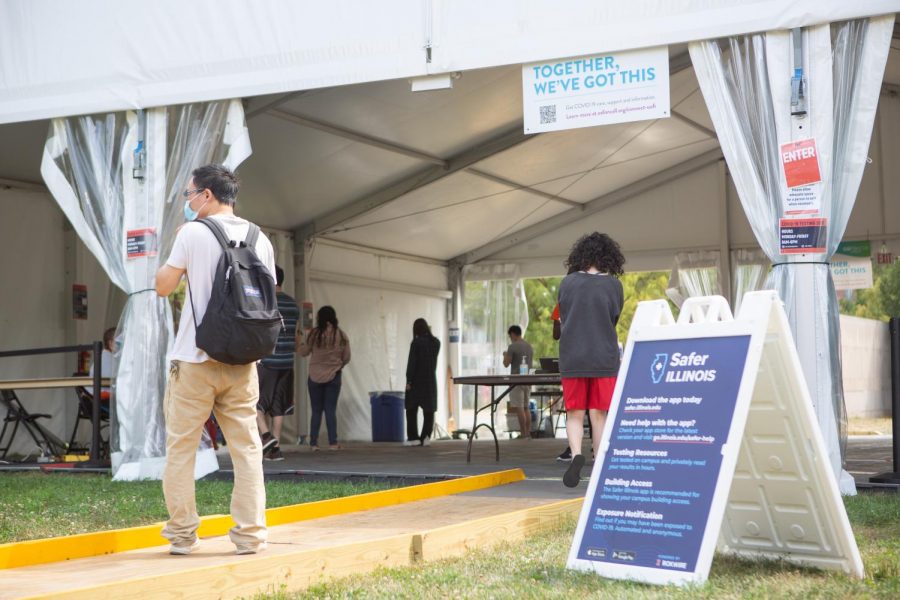Safer Illinois provides digital support for COVID-positive students
Students wait at the testing site at the National Center for Supercomputing Applications on Aug. 30. A helpful feature of the Safer Illinois app is the OSF OnCall Connect program, which puts COVID-positive people in contact with OSF OnCall team members.
September 14, 2020
The Safer Illinois app is mainly used by the on-campus University community to track COVID-19 test results and gain access to buildings.
One overlooked feature allows COVID-positive users to get medical advice without leaving their isolation spaces.
The OSF OnCall Connect program allows students, faculty and staff who test positive for COVID-19 to connect daily with OSF OnCall team members through phone, video or text chat for up to 16 days for free.
“(These are) people who are trained to take care of people, delivering expert and trusted advice,” said John Vozenilek, OSF’s chief medical officer for innovation and digital health.
When students receive a positive test result through the Safer Illinois app, there is a care team button they can tap, which directs them to call in and begin the enrollment process.
Get The Daily Illini in your inbox!
It’s always been a part of the app, but OSF is still trying to get the word out and get more students to enroll, said Colleen Reynolds, media relations coordinator for OSF HealthCare.
“This was built off of what we were doing in the community almost since the start of the pandemic,” said Reynolds.
OnCall Connect was developed in partnership with the Illinois Department of Healthcare and Family Services to cover patients across the Central Illinois region. The service was reworked for campus once OSF was brought into the discussion of the University’s return plan.
“The whole program for campus was designed around the principle that it wasn’t just screening … it was also clinical services that were going to be needed to keep the population, and the students in particular, safe,” Vozenilek said.
The OnCall Connect program has different layers of check-in, depending on how severe the symptoms of the patient are.
The Acute COVID@Home program consistently monitors those with more severe COVID symptoms.
Patients are delivered packages of devices to monitor their blood pressure, temperature and oxygen saturation. They are also given a tablet that directly connects them to nurses from the Home Health Team.
Connected through Bluetooth, the results of the devices are sent to OSF, which can then regulate the services provided “day by day or even hour by hour if necessary,” Vozenilek said.
“It prevents people from needing to occupy hospital beds in a time when that resource may be precious, but still gives us the safety of being alerted to changes in vital signs,” Vozenilek said.
OSF has also provided the University with patient monitoring care kits which are given to students in isolation dorms. The care kits include health education materials, hand sanitizer, a thermometer and information on how to use OnCall Connect.
In April, OSF established a 24/7 (833)-OSF-KNOW call-in hotline for anyone who wanted to enroll in the program.
On a daily basis, about 4,500 calls are made to the hotline, Vozenelik said.
Reynolds said the OnCall Connect program can provide reassurance for students who test positive and encourage them to quarantine and take care of themselves.
“The program was set up for the ‘now what do I do?’ question,” Vozenilek said. “COVID can affect people who have unknown immune system response changes, have a history of some kind of medical problem, and it really does appear uniquely to an individual based on their background.”
Editor’s note: A previous version of this article stated that faculty and staff who test positive for COVID-19 would connect daily with pandemic health workers. However, they would connect with OSF OnCall team members. The Daily Illini regrets this error.







